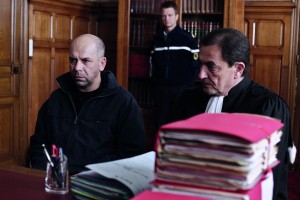‘Guilty’ is a harrowing story of how one man loses everything

Watching the new French film, Guilty, is an unsettling experience. The real-life story of Alain Marécaux, a bailiff wrongly accused of unspeakable crimes, can teach viewers many lessons about the legal system, the prison system and the power of lies in the public sphere. Philippe Torreton offers a heartbreaking performance as Alain, sacrificing so much to tell the difficult story of this broken man.
The movie, which runs a slim 102 minutes and will be featured at the Rendez-vous with French Cinema Festival in New York City, jumps right into the subject matter, shocking us almost within seconds with the serious allegations. Alain and his wife, Edith (Noémie Lvovsky), wake up early one morning to the police banging on their front door. Their children are scared and screaming, and Alain has no idea what’s going on.
It’s only after the handcuffs are strapped around his wrists that one of the officers says that he and his wife are being arrested for their alleged involvement in a child prostitution ring. Witnesses have stepped forward, and apparently the prosecutor has enough evidence to indict. The bailiff, who constantly tells us throughout the movie that he’s devoted to his family, is struck almost speechless. He can’t believe this turn of fate has befallen the Marécaux household. It must be a misunderstanding.
The movie continues to follow Alain as he mounts his defense. His lawyer (a very good Wladimir Yordanoff) believes in his client and promises that he’ll be out before Christmas. But Alain’s turmoil has only just begun. The court refuses to release him on bail and the investigators seem intent on sullying his reputation and innocence.
Guilty is an effective piece of drama that never feels typical or cliche like so many police/legal procedurals. Besides the inherent scandal of the case, the plight of Alain and his family humanizes the story so it becomes difficult to look away from the screen. From an outsider’s perspective, it looks like a normal family has been severely disrupted, ripped apart and broken forever.
If anyone followed the real case in France, Alain’s ultimate fate has been known for years. But watching him work for years to that inevitable conclusion is painstaking. He undergoes multiple suicide attempts to free himself of the torture. He stages a hunger strike. His mother dies from all the grief the spectacle has caused the family. Everything in his life — from money to his children — has been violently taken away.
The movie works so well chiefly because of Torreton’s performance. He wears the worry on his beleaguered face, and there are few scenes where he offers a smile. Whether he’s crying on his prison bed, hoping the other inmates don’t find out about his alleged crimes, or when he loses mobility in his legs from not eating enough food, Torreton makes us believe in the deterioration of Alain. The movie would not work as well without the actor.
The final third of the film, which deals mostly with the outcome of the case, does get somewhat lost in the hoopla of the sensationalism. The courtroom scenes don’t seem entirely accurate, and they border on ludicrous, almost like Arthur Miller’s The Crucible (although with the craziness of this legal fight, maybe it’s exactly how it happened). Watching the case unfold, the audience focuses on Alain and that pained face. Torreton makes him so believably broken that it’s hard to look away.
By John Soltes / Publisher / John@HollywoodSoapbox.com
-
Guilty
-
2012
-
Directed by Vincent Garenq
-
Written by Garenq, in collaboration with Hubert Delarue, Serge Frydman and Alain Marécaux
-
Starring Philippe Torreton, Wladimir Yordanoff and Noémie Lvovsky
-
Running time: 101 minutes
-
Playing as part of the Rendez-vous with French Cinema Festival in New York City. Click here for more information.
-
Rating:





